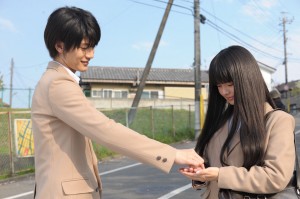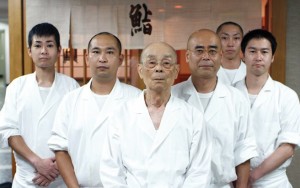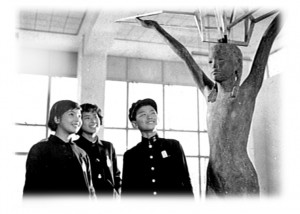JQ Magazine: Four Cups of Sake, ‘Three☆Points,’ Two Beers, and One Night with Sora Aoi

Sora Aoi at New York's Japan Society for the ‘Three☆Points’ premiere, July 15, 2011. (Justin Tedaldi)
By Rick Ambrosio (Ibaraki-ken, 2006-08) for JQ magazine. Rick manages the JET Alumni Association of New York (JETAANY)’s Twitter page and is the creator of the JETwit column Tadaima!
So I’m here to give you my Three☆Points review. I’m sure you’ll find it somewhere down there. I mean I could just write you about the movie. but that would be unfair, it would be out of context, it would be devoid of what makes this process fun. You see, New York’s Japan Society once again pulled out all the stops for their JAPAN CUTS film festival, and tonight was its apex; the American Premiere of Three☆Points, with a Q&A from actress Sora Aoi and director Blah Blah something Japanese. Not to mention an after party with a DJ, food, and all the beer you can drink. Reviewing things has its perks. If for some reason you don’t know who Sora Aoi is, please, by all means, look her up, Google her. Try doing it at work, under unfiltered pictures. Have your boss and co-workers gather around. It’ll be totally appropriate.
But anyways, there I am at Megu, the uber-fancy restaurant in the Trump World Tower next door to Japan Society. It was Restaurant Week in NYC, so two friends of mine and my girlfriend accompanied me there for a pre-show meal. Little did I know the dinner would be so light on “meal” and heavy on sake-tasting. It was supposed to only be three sakes but they messed up and gave us four. Not so much a problem, but at a place where a single person can easily drop $200 on a meal, going for Restaurant Week and only paying $35 a person results in a curtailed dining experience, no matter how delicious.
So after demolishing a breaded asparagus, a smattering of fresh sushi and a fantastic green tea crepe, I stumbled over to Japan Society ready for my date with destiny. Of course, that would need a moment, since four sakes meant I needed to use the men’s room. The line was out the door, though. People had come out en masse to see Ms. Aoi. I waved to a couple of the volunteers I knew as I jogged down the stairs towards the bathroom. My girlfriend was along for the fun as well, and she darted into the women’s room.
On exiting I lingered, waiting for my girlfriend. I watched where the serpentine line ended; at the opening to the 300-plus seat, meticulously clean theater in Japan Society. I knew both the ticket takers. I debated in my head as to if I should attempt to cut all the eager people in line with a high five to score good seats and impress my girlfriend. My “don’t be a douche” motto rendered this plan a bad idea, and instead just patiently, drunkenly waited for the poor girl who got stuck dating me.
Jen Wang (Miyagi, 2008-09) is a lab tech in Dallas and a staff writer for the Japanese music website Purple SKY. Her love of cosplay and her junior high school students inspired the name for her own Japanese pop culture blog, Hibari-sensei’s Classroom.
Since there have been a couple posts here about JAPAN CUTS film festival in New York, I thought I would write about a Japanese movie I saw at the Asian Film Festival of Dallas last week. The festival was in its 10th year and ran from July 14-21. Among the Japanese films screened was the 2010 live-action adaptation of the popular shoujo manga series, Kimi ni Todoke (in English, From Me to You).
Filled with a young actors, the movie seemed like a typical high school romance in which shy loner Sawako Kuronuma, who is made fun of for her resemblance to Sadako of The Ring, catches the eye of class heartthrob Shota Kazehaya. However, it is more a story about Sawako coming out of her shell and forging tight bonds with the people who reach out to her. The muted colors and leisurely pace make the film light and gentle, yet there are moments that remind us that adolescence years can contain heartache. More importantly, Kimi ni Todoke reminds us that a little kindness can go a long way.
For a complete review of the film, click here.
WIT Life #176: 悪人
WITLife is a periodic series written by professional Writer/Interpreter/Translator Stacy Smith (Kumamoto-ken CIR, 2000-03). She starts her day by watching Fujisankei’s newscast in Japanese, and here she shares some of the interesting tidbits and trends together with her own observations.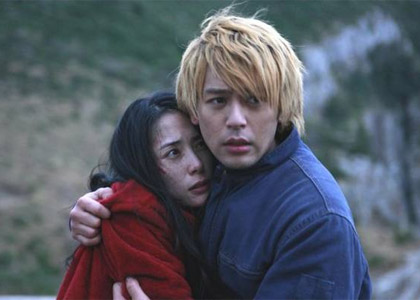
First off a huge OMEDETOU to the Japanese women’s soccer team for winning the World Cup over the weekend! I watched the game with the Japanese delegation I have just begun interpreting for, and needless to say it made our night. The victory has been a nice boost of encouragement for the country, and is something all of its citizens can take pride in.
The Japan Cuts film festival at Japan Society is going strong in its second and final week, and in my next few entries I hope to discuss some of the great movies I’ve been seeing. But today I’d like to talk about another interesting film that made its New York premiere when it was screened last week as part of the Nippon Eiga series sponsored by ANA. It was 悪人 (Akunin) or Villain, and featured the two amazing actors Satoshi Tsumabuki (as the villain) and Eri Fukatsu (as the woman who falls in love with him). It was directed by Sang-il Lee who also made Hula Girls, another movie that was screened as part of ANA’s series a few years back.
Fukatsu received the Best Actress award at the Montreal World Film Festival last year for playing this role, a worthy performance. She and Tsumabuki always have great chemistry (I loved them in Read More
JQ Magazine: Film Review – ‘Sword of Desperation’ and ‘The Last Ronin’ at JAPAN CUTS 2011
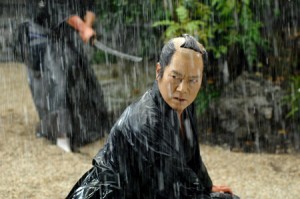
A scene from 'Sword of Desperation,' screened in New York last week as part of the JAPAN CUTS film festival. (Courtesy of Japan Society)
By Paul Benson (Fukui-ken, 2006-08) for JQ magazine. Paul is a New York-based freelance translator who has handled assignments ranging from securities law to cookbooks.
This past week I had the pleasure of seeing two films in Japan Society’s annual JAPAN CUTS film festival. The festival runs from July 7-21, with 32 films (nearly all of them premieres). I was instantly drawn to JAPAN CUTS’ only two jidaigeki 時代劇 samurai films in the series, Sword of Desperation 「必死剣鳥刺し」 and The Last Ronin 「最後の忠臣蔵」. The films were wonderful, and I encourage you to seek them out.
Sword of Desperation (2010, dir. Hideyuki Hirayama) is a poised and powerful film of feudal intrigues and expert swordsmen, a fine addition to the chanbara チャンバラ (“sword-fighting”) genre. Set in the Edo Period (1600-1868), Sword of Desperation has all the genre’s usual devices: a gradual build-up to an outburst of action, an alienated master swordsman, and conflicts of duty and heart.
The film’s first half beautifully establishes the circumstances, characters and their relationships. Etsushi Toyokawa plays the character Sanzaemon Kanemi, a master swordsman, who serves the daimyo Tabu Ukyō (Jun Murakami). At the start of the film (set three years ago), Kanemi murders his master’s favorite concubine, Lady Renko (Megumi Seki), just after the annual spring Noh performance. It soon becomes clear that Kanemi acted to stop Lady Renko from further manipulating the daimyo and damaging the domain’s administration. Kanemi is given a light sentence—a year of house arrest and a meager pay decrease—and he is allowed to return to service afterward. Yet, he soon finds himself losing his wife Mutsue (Naho Toda), faced with the affections of his niece, and lost in the intrigues of others, a situation to which blood is the only way out.
While the pacing of the film might feel disjointed and sluggish to the unfamiliar, anyone acquainted with the chanbara genre is in for a treat. The previous two chanbara films I’ve seen are When the Last Sword Is Drawn 「壬生義士伝」 (2003, dir. Yōjirō Takita) and Sword of Doom 「大菩薩峠」 (1966, dir. Kihachi Okamoto). These didn’t disappoint, and neither does Sword of Desperation. The film has beautiful sets and scenery, a simple but moving plot, and a great twist at the end.
Justin’s Japan: Superstar Sora Aoi Appears This Week at Japan Society’s JAPAN CUTS 2011

'Three☆Points' star Sora Aoi will appear at New York's Japan Society July 15 with the film's director Masashi Yamamoto. (Courtesy of Japan Society)
After doing boffo box office last week with sold-out screenings of Osamu Tezuka’s Buddha, Battle Royale and the Gantz duology, Japan Society’s JAPAN CUTS 2011 will reach the boiling point this Friday (July 15) with a very special guest: international cause célèbre Sora Aoi. With a career spanning nearly a decade in Japan’s adult video (AV) industry, Aoi (whose stage name translates to “blue sky”) has also moonlighted in television dramas, film and mainstream entertainment, even enjoying success in China as a pop singer.
The actress will appear at Japan Society supporting her latest drama, Three☆Points, with its director Masashi Yamamoto helming a Q&A. The pair will also join a special after party after the screening to meet fans personally. Other Special guests slated for the rest of JAPAN CUTS include The Seaside Motel director Kentaro Moriya, A Liar and a Broken Girl director Natsuki Seta (both July 16), and Haru’s Journey director Masahiro Kobayashi (July 20).
All films—most of them New York premieres–are primarily shown in Japanese with English subtitles, some with actor/director intros and Q&As and after parties.
For more on the remaining cuts, click here.
Japan Fix London: Hyper Japan – Interview with Mary Moreton
Posted by Dipika Soni (Ishikawa-ken, 2003-06). Dipika has recently moved back to London as is currently looking for new work opportunities related to Japan, writing and translation.
——————————————————————————————————————————–
 It’s not surprising that London has changed a lot during the years I’ve been away in Japan. Being the “most populous municipality in the European Union”, rapid development, modernization and globalization are to be expected. However, it still throws me of guard when my British friends now drop ‘katsu-don’, ‘kirin beer’, and ‘kawaii’ into everyday conversation. I know those words weren’t part of my vocabulary before I took off for my life as an ALT!
It’s not surprising that London has changed a lot during the years I’ve been away in Japan. Being the “most populous municipality in the European Union”, rapid development, modernization and globalization are to be expected. However, it still throws me of guard when my British friends now drop ‘katsu-don’, ‘kirin beer’, and ‘kawaii’ into everyday conversation. I know those words weren’t part of my vocabulary before I took off for my life as an ALT!
For a recently returned expat like me, it is a huge comfort to see Japanese culture so widely embraced in my home city. Which is why I was particularly excited to hear about HYPER JAPAN, a three day event promoting all the different aspects of Japanese culture that make it so appealing to us in the west. Determined to get my ‘Japan-fix’ to fight off the homesickness, I applied for a volunteer position and was delighted to discover one of the Hyper Japan team, Mary Moreton, was a fellow ex-JET. Not one to miss a chance to share JET stories, Mary kindly agreed to meet me one soggy London afternoon.
 Hi Mary, sorry for dragging you out in this! Could you start by telling me a bit about your time on JET – why you applied, where you were based?
Hi Mary, sorry for dragging you out in this! Could you start by telling me a bit about your time on JET – why you applied, where you were based?
I was a CIR in Aomori City CIR from 2002 – 2005. I studied Classical Japanese Literature at University, which was a really interesting course that I enjoyed a lot, but not necessarily a degree that could lead straight to a clear career path. I wasn’t interested in working in say finance in the city like many of my friends, and I had spent time in Japan before (I did a year out in Osaka), so I decided to apply for JET.
How did you find Aomori compared to your experience of living in Osaka? I would imagine it to be quite different!
Yes, it was completely different to my previous experience of living in the city. I remember in my first week, there was another girl from UK who was based at the kencho, and we decided to meet up and explore one day. We walked around for about 10 minutes until we realised there really wasn’t much to see! It was totally different from my experiences of urban areas such as Tokyo, Osaka and Kobe.
What did you do after JET?
After returning from JET, my first job was as a PA for the European director of a Japanese electronics company where I was working in a mainly Japanese environment. Even though I had left Japan, during my working day, things weren’t too different. Although I felt that my unique point was my Japanese ability, I did not necessarily want to restrict myself to working for Japanese companies. I then went on to work for a British based Insurance broker. I worked in their Japanese department, so I was still using Japanese but not working in a completely Japanese environment as I had been used to. I had always been interested in translation, so in addition to working, I decided to do a part-time MA in translation. In the end I had to quit my job to focus on my dissertation in the last term.
With my MA finished I then decided to do freelance translation and signed up with several Japanese agencies. Not all of them gave regular work, and there were certain areas of translation (technical) that I couldn’t do, but after settling into a good relationship with a few coordinators, I managed to find my niche. Through that I did some work for the Sushi Awards, which led to my current position with Cross Media. Once again I am working as the only native English speaker in a Japanese company, but I enjoy it a lot as I get to promote all the things I love about Japanese culture and cuisine, and share it with a whole new audience.
Could you tell us a bit about the background of Hyper Japan?
 The Eat-Japan Sushi Awards have been around for a few years. Japanese food is a lot more popular now in the UK than when I left in 2002 to go to Japan. Now there are so many places around where you can try Japanese food, and there is a lot more scope to promote it – which is where the idea for the sushi awards came from.
The Eat-Japan Sushi Awards have been around for a few years. Japanese food is a lot more popular now in the UK than when I left in 2002 to go to Japan. Now there are so many places around where you can try Japanese food, and there is a lot more scope to promote it – which is where the idea for the sushi awards came from.
Japanese anime, manga and games have always had a fanbase in the UK and the rest of Europe, and there is a large Japan Expo held in Paris which mainly focuses on these aspects of Japanese culture.
I think most people think that Japan is cool, but not necessarily for just one thing. There are separate events to cater for cosplay, anime, and sushi fans, however there wasn’t anything that brought all these together – which what Hyper Japan attempts to do. In the same way that people who live in Japan experience the old and the modern co-existing harmoniously (you could find a Shinto shrine next door to a pachinko parlor), Hyper Japan aims to showcase both the contemporary and classic sides of Japanese culture under one roof.
To read the rest of the interview, click ‘Read More’.
Read More
WIT Life #175: Japan Cuts 2011
WITLife is a periodic series written by professional Writer/Interpreter/Translator Stacy Smith (Kumamoto-ken CIR, 2000-03). She starts her day by watching Fujisankei’s newscast in Japanese, and here she shares some of the interesting tidbits and trends together with her own observations.
The 2011 Japan Cuts Film Festival at Japan Society is back and better than ever, with a lineup of 32 films and 33 screenings in total. Like last year, I decided to volunteer in various roles such as ushering and ticket taking, as that allows you to stick around and enjoy the movies. The first movie I worked at was Love & Loathing & Lulu & Ayano (名前のない女たち) which was screened this past Friday night.
Director Hisayasu Sato, known as one of the “Four Heavenly Kings of Pink” for his work in ピンク映画 (pinku eiga) or soft-core porn films, incorporated his background into this movie released in Japan last year. It tells the story of a meek OL who is scouted in Shibuya to work in Read More
Dreams Come True to hold rare concerts in U.S. Any JET alums going?
Just heard from Aaron Woolfolk (Kochi-ken) (writer and director of the film “The Harimaya Bridge”) that he’s going to the Dreams Come True concert in L.A. in October and that they’ll also be playing concerts in Seattle and NYC as well as free concerts in Iwate, Miyagi and Fukushima.
Here’s a June 28 post about the concerts from Anime News Network.
If you’re a JET or JET alum and plan on going, post a comment here and let the JET alum community know.
Justin’s Japan: Japan Society’s First Week of JAPAN CUTS 2011 Offers ‘Buddha,’ ‘Battle Royale’
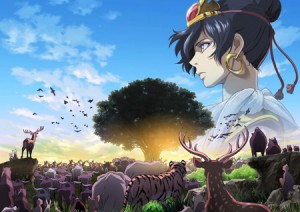
Japan Society of New York's JAPAN CUTS 2011 film festival kicks off with 'Osamu Tezuka’s Buddha: The Great Departure' July 7. (© 2011 Osamu Tezuka’s Buddha Production Committee)
By JQ magazine editor Justin Tedaldi (CIR Kobe-shi, 2001-02) for Examiner.com. Visit his page here for related stories.
Seeking summer movie asylum from Autobots and aging boy wizards? Head to Japan Society.
Now in its fifth consecutive year, the JAPAN CUTS 2011 film festival includes 32 new titles—the biggest lineup in the festival’s history with (almost) nothing but premieres and one-off shows—running from July 7 to 22, including ten co-presentations with the New York Asian Film Festival (NYAFF).
“Arguably North America’s premier showcase for Japanese film” (Firefox News), JAPAN CUTS screens the cutting edge of contemporary Japanese fare, caroming between elegant drama to anything-goes comedy to uncanny experimentalism.
All films—most of them New York premieres–are primarily shown in Japanese with English subtitles, some with actor/director intros and Q&As and after parties.
For the complete list of this week’s cuts, click here.
WIT Life #169: Happy Doll Fundraiser

WIT Life #167: Japan and War as Seen Through the Lens of Film
WITLife is a periodic series written by professional Writer/Interpreter/Translator Stacy Smith (Kumamoto-ken CIR, 2000-03). She starts her day by watching Fujisankei’s newscast in Japanese, and here she shares some of the interesting tidbits and trends together with her own observations.
Recently I had the chance to see two films from 2010 that examine the issue of Japan and war. One was Anpo: Art x War which was screened at Columbia University last week, and the other is Caterpillar currently being shown at the IFC Center through this Thursday. The former is a documentary directed and produced by Linda Hoaglund, and the latter is a film made by the director Koji Wakamatsu of United Red Army fame (shown at Japan Society a few years ago and coming to IFC later this month).
Anpo uses a mixture of paintings, photos, anime, films and music by Japanese artists to Read More
WIT Life #164: More notable Nihonjin
WITLife is a periodic series written by professional Writer/Interpreter/Translator Stacy Smith (Kumamoto-ken CIR, 2000-03). She starts her day by watching Fujisankei’s newscast in Japanese, and here she shares some of the interesting tidbits and trends together with her own observations.

Interesting article in the NYT today profiling the new head of the M.I.T Media Lab, a 44-year old Japanese venture capitalist named Joichi Ito. Ironically enough, Ito attended both Tufts and the University of Chicago in the past, but didn’t graduate from either as he didn’t like their learning styles. However, his accomplishments include serving on the board of the Internet governance organization Icann and the Mozilla Foundation, and along the course of his career he has invested in more than 12 start-ups such as Flickr and Twitter. In Japan, he helped establish Read More
Justin’s Japan: Tribeca Film Festival Q&A with director David Gelb on ‘Jiro Dreams of Sushi’
By JQ magazine editor Justin Tedaldi (CIR Kobe-shi, 2001-02) for Examiner.com. Visit his page here to subscribe for free alerts on newly published stories.
An indubitably delicious documentary, Jiro Dreams of Sushi follows 85-year-old master sushi chef Jiro Ono, owner of the esteemed ten-seat Sukiyabashi Jiro restaurant in Tokyo. From the ins and outs of the tuna auction to the proper way to massage an octopus, the film is a lushly photographed homage to the artisan sushi techniques that earned Jiro an elite three Michelin stars, one of just twenty-six restaurants in all of Japan to receive the honor last year.
This mouthwatering movie makes its New York bow Thursday (April 21) as part of the Tribeca Film Festival. In this exclusive interview, I caught up with director David Gelb to discuss his cinematic celebration of the art of sushi, along with its themes of family, tradition, and the value of hard work.
Tell us about your relationship and history with Japan.
When I was very young my parents took me to Japan on business trips. Even though I was only nine years old the third time I went, I already felt a tangible familiarity and affection to the food and the culture. The toys were definitely cooler. I was as fascinated by a history populated by samurai and warlords as much as the fiction with the giant robots and all that.
What else do you enjoy most about Japanese culture?
My favorite thing about the Japanese culture is the philosophy of specialization and mastery. There is a lot of value and respect for people that devote their lives to a single craft. You don’t see this as much in some Western countries.For example, in the USA, many local butchers have been driven out of business by supermarkets. Because of this, the sons of butchers are looking for other jobs to survive, and the skills they and their fathers have developed will be lost. In Japan, however, you’ll see more businesses dedicated to excellence before profits. Being a master butcher is a highly respected and potentially lucrative enterprise. Even in Japan, however, the consolidation of big business and globalization is a threat to craftsmen in small shops. According to many Japanese craftsmen that I interviewed, it has become harder to find young people that have the patience to learn a skill fully. In Japan, it takes years to become a master butcher.
What were your goals with this film? Did it turn out the way you originally anticipated, or did anything about it change during the production period?
Originally, this was going to be a much more general film that would feature many sushi chefs all over the world. In my mind it was the [celebrated BBC documentary] Planet Earth of sushi. I shot some short test segments, but then changed course and decided on a more human approach, making it just about Jiro and his family. Everything I wanted to convey about sushi was right here at Jiro’s restaurant.
How much time in all did you spend filming? Was it difficult to shoot in Japan and work around scheduling repeat visits to Tokyo?
I shot for the month of February in 2010, then returned to L.A. to work with my editor, Brandon Driscoll-Luttringer. After we spent a few months translating and reviewing the footage, we figured out what the story was about, and I returned to Japan to finish. I had some fantastic help on the ground in Tokyo—my translators Yukako Inoue and Shino Nakamura—to organize everything. Without them, it would have been extremely difficult.
What were Jiro and his family’s ground rules for making the film? Was there anything that you were forbidden from shooting?
The only rule was not to film the duo of incredibly hardworking and meticulous ladies that are in charge of cleaning and the cash register. It is a shame because one of the amazing things about Sukiyabashi Jiro is that it is probably the cleanest and most organized restaurant in the world. Literally not a spec of dust goes unchecked in the entire restaurant. The bottoms of the tables are just as clean as the tops. Women of that generation are particularly shy of cameras, and I was very careful to respect their wishes not to be filmed.
Read the rest of the interview here.
WIT Life #156: 4th Annual Peace Festival
WITLife is a periodic series written by professional Writer/Interpreter/Translator Stacy Smith (Kumamoto-ken CIR, 2000-03). She starts her day by watching Fujisankei’s newscast in Japanese, and here she shares some of the interesting tidbits and trends together with her own observations.
Like most of you, I have spent the last couple of days glued to the coverage of the earthquake/tsunami/radioactive fallout news from Japan. I left Tokyo the day before the quake and was shocked to come home to the awful news. The feelings of helplessness and immense sadness can be overwhelming at times, so I was happy to be able to help out as a volunteer interpreter at the 4th Annual Peace Festival this weekend. It just felt like the right place to be in the midst of all that is happening.
On Saturday night I attended the world premiere of Twice Bombed: The Legacy of Tsutomu Yamaguchi, which told the amazing tale of this first officially recognized double atomic bomb survivor (二重被爆者 or nijuu hibakusha) who passed away last year at the age of 93. Yamaguchi was in Hiroshima and Nagasaki on August 6th and 9th respectively and was a truly inspiring figure, beginning his speaking out about his experience just five years before he died. Up until that point, his wife and daughter had encouraged him to stay silent as they were scared that Read More
this first officially recognized double atomic bomb survivor (二重被爆者 or nijuu hibakusha) who passed away last year at the age of 93. Yamaguchi was in Hiroshima and Nagasaki on August 6th and 9th respectively and was a truly inspiring figure, beginning his speaking out about his experience just five years before he died. Up until that point, his wife and daughter had encouraged him to stay silent as they were scared that Read More
JQ Magazine: JQ&A with Yumi Tanaka of the New York Peace Film Festival
By JQ magazine editor Justin Tedaldi (CIR Kobe-shi, 2001-02). For more Japanese culture, visit his Examiner.com page here.
Manhattan’s Upper East Side kicks off the weekend with the 4th Annual New York Peace Film Festival, which promotes a deeper understanding of international relations from films and presentations worldwide. Saturday focuses on the devastation of the atomic bomb, beginning with the 1958 Japanese film A Thousand Cranes, the story of young Hiroshima bomb victim Sadako Sasaki. JQ caught up with Yumi Tanaka, the festival’s co-founder and executive producer, for this exclusive interview.
Tell us a little about yourself.
I was born and raised in Japan and came to the States to attend college. Upon graduation, I landed a job and remained in the country. When I moved to NYC for a job, I also started taking an acting class. I thought it will help me at business meetings when I have to do a presentation. I loved theater since I was a child. My first experience was with the Takarazuka Revue at the age of three with my father. I studied theater, as literature helped me taking these acting classes, and I was recommended to do a stand-up comedy workshop then. That’s how I started doing stand-up comedy while holding a real job. Then, I pursued the entertainment industry. I took serious acting classes from a teacher who had taught many famous comedians like Ray Romano, and the list goes on.
It was 9/11 that changed my life. I wanted to do something more meaningful instead of being onstage at smelly comedy club to make drunks laugh. In 2005, I met a Hiroshima survivor visiting New York for an NPT [Nuclear Non-Proliferation Treaty] conference. He told me his life story; how he was hiding as a hibakusha [atomic bomb survivor] for a long time. Then, he said, “Hibakusha are getting older. If we all die, the, there’s no people who carry on to tell our stories.” That was the moment. I thought I could use my knowledge and experiences with theater to tell their story.
In 2006, I met Jonathan Fluck, who used to run children’s theater for over 20 years. He had just produced a poetry performance of Hiroshima and Nagasaki. A mutual friend introduced us. Although Jonathan had never been to both cities, his passion towards nuclear abolition was in sync. So we started the New York Peace Film Festival in 2007, and we’ve held one every year except 2009 due to the bad economy.

